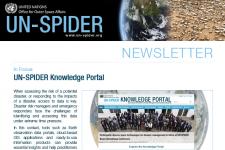Download the newsletter (1.85 MB)
When assessing the risk of a potential disaster, or responding to the impacts of a disaster, access to data is key. Disaster risk managers and emergency responders face the challenges of identifying and accessing this data under extreme time pressure.
In this context, tools such as Earth observation data portals, cloud-based GIS applications and ready-to-use information products can provide essential insights and help practitioners all over the world access the data they need quickly. In many cases, however, identifying relevant resources and developing the capacity to use them remains a challenge.
The UN-SPIDER Knowledge Portal helps address this issue by providing a gateway to access space-based data and information relevant for all phases of disaster management – from prevention and mitigation measures before a disaster to rehabilitation and recovery activities afterwards. The website, which attracts over 30,000 users a month, complements the technical advisory support that the UN-SPIDER programme offers to UN Member States. It also supports its work bringing together the space and disaster management communities all over the world to exchange on needs and space-based solutions.
The Portal provides a wide range of content that visitors can explore by a number of parameters such as the type of natural hazards and phase of the disaster management cycle the content relates to. These filters help users quickly find relevant information. Through examples of hazard-specific applications, presented in the form of “Data Application of the Month”, the Knowledge Portal shows how space-based information can support disaster management efforts.
Access to data or software is not enough to use space-based information in disaster management; users also need the capacity and skills to apply the resources available. Together with its Regional Support Offices and private sector partners, UN-SPIDER develops step-by-step procedures, so-called Recommended Practices, that outline all actions required for disaster management professionals to create space-based information products such as flood and drought maps. The procedures include detailed instructions for downloading, processing and visualizing space-based data. Through the Recommended Practices, the programme helps turn data into knowledge and insights that can inform decision making. The Practices are also used during in-person training courses that UN-SPIDER conducts at the request of Member States.
This edition of the newsletter provides a closer look at the Knowledge Portal and its resources.
| Attachment | Tamaño |
|---|---|
| UN-SPIDER Newsletter 2/20 - Knowledge Portal (1.85 MB) | 1.85 MB |

